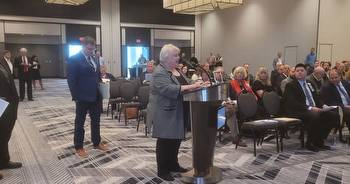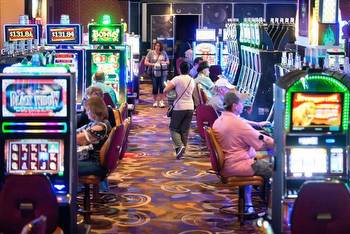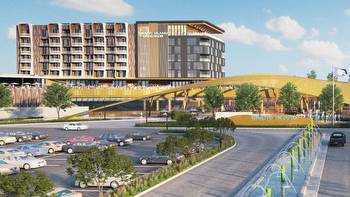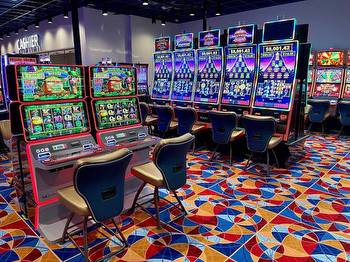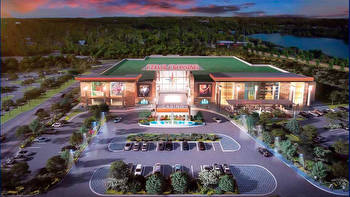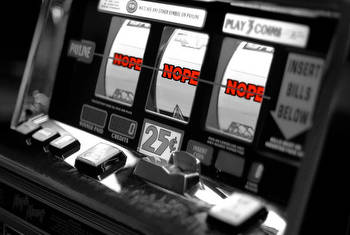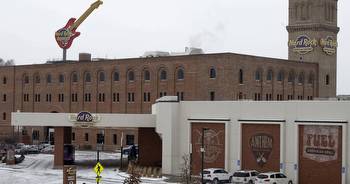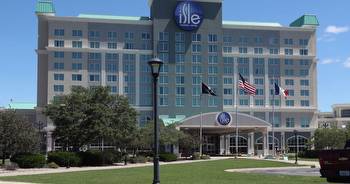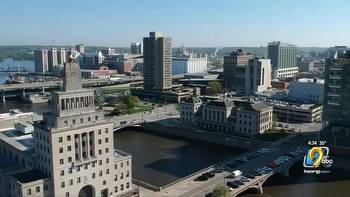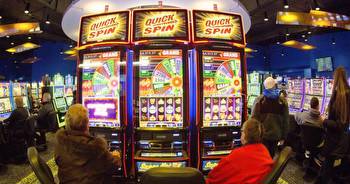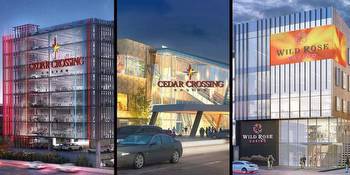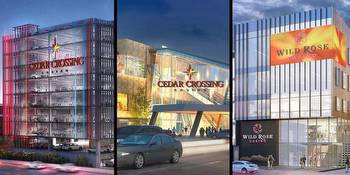Cedar Rapids’ casino plans envision $250 million ‘Cedar Crossing’ entertainment complex at old Coope
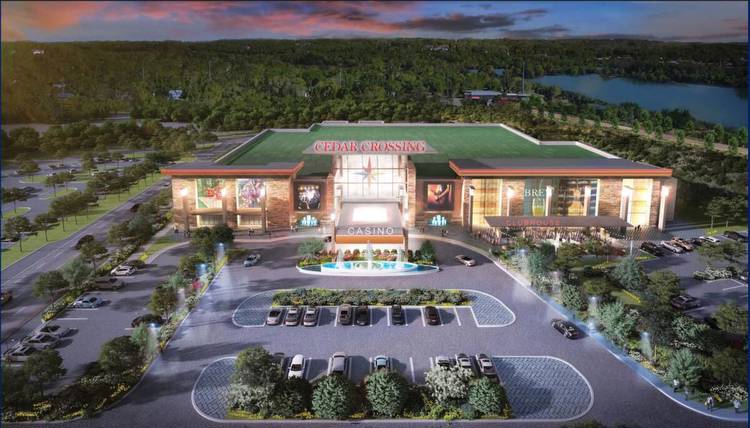
CEDAR RAPIDS — Undeterred by state lawmakers’ action to block new casino licenses until 2024, local casino backers have unveiled plans for a $250 million, 160,000 square-foot entertainment and cultural arts complex near downtown Cedar Rapids at the site of now-demolished Cooper’s Mill.
The Cedar Crossing casino proposal, shared exclusively with The Gazette, calls for bars, restaurants, a 1,500-capacity entertainment center and other venues along the west side of the Cedar River, between Kingston Village and Time Check Park. Gaming interests believe the complex would set a new bar for Iowa casinos.
The project also would incorporate flood control to protect the structure from rising waters.
The Cedar Rapids Development Group, an entity of mostly local investors, and Linn County Gaming Association, the nonprofit that would allocate a slice of revenue to local nonprofits, will jointly apply for a gaming license with the Iowa Racing and Gaming Commission after the proposed state moratorium on new licenses ends in June 2024.
The moratorium takes effect June 1, pending a signature from Gov. Kim Reynolds, who said Friday she was reviewing recently passed legislation with her staff.
The local investors, the gaming association and potential operator Peninsula Pacific Entertainment initially planned to share development plans after state regulators had indicated they would set a timeline for taking applications for a Linn County gaming license.
But that plan changed after Iowa lawmakers, with scant notice, passed the moratorium within the last 48 hours of the state legislative session this past week.
“It’s time that Cedar Rapidians understand what is truly at stake here,” Mayor Tiffany O’Donnell said. “It is certainly entertainment and amenities, and it’s jobs, it is economic development and it is flood protection.
“This is what the Legislature took away from us.”
Jonathan Swain, president of Peninsula Pacific Entertainment, the city’s preferred casino operator, said the Cedar Crossing team’s commitment to Cedar Rapids and Linn County “is not wavering one bit based on what happened last week.”
“Whatever the outcome is, whether there’s a veto or not a veto, we will be there for Linn County,” Swain said.
“We look forward to eventually bringing this project to fruition and bringing all the benefits to the nonprofits, jobs and all the economic opportunity that Cedar Crossing brings. Whatever happens’ we’re ready for it, so let’s go.”
The Cedar Crossing name borrows from the team’s 2017 proposal, which state regulators opted not to license — marking the second time Cedar Rapids’ attempt for a casino failed since 2014.
“We love the Cedar Crossing name, and we think that that continuity is important,” Swain said, adding that it demonstrated the team’s commitment to building a casino in Cedar Rapids — whether today or two years from now.
Swain said this project is intended to capture the maximization of revenue, between 800 and 1,100 gaming machines and 40 to 60 table games. But the key difference with this sales pitch is the level of investment in the nongaming components.
“That’s really what’s going to draw young audiences to the future casinos,” Swain said. “As we look forward in the next 10 years, we think this is a critical differentiator for what we’re doing with this project versus everything else that’s in the state.”
The proposed location at F Avenue NW, which used to host the Best Western Cooper’s Mill hotel until it was demolished after sustaining damage in the 2008 and 2016 floods. The site is now city-owned.
Years ago, when the land at First Street SW and First Avenue W was earmarked for a casino, Swain said the site wasn’t viable because it wasn’t included in flood protection plans. Now, the city plans to incorporate a levee system, he said.
The Cedar Crossing team vowed the structure would “provide important flood protection infrastructure,” which Swain said would be a flood wall. Swain said there was no cost estimate yet available as the project still is in the design phase.
“This is a better location, better visibility, larger footprint, much more ability to be creative,” Swain said of the site, which is near Interstate 380.
Mayor O’Donnell and Anne Parmley, president of the Linn County Gaming Association board, said the casino would present a major opportunity for redevelopment on the west side of the river.
“The facility and the venues are terribly exciting,” Parmley said. “It's just as much of an entertainment center as it is a casino or gaming center, if not more, and so I think people will get really excited about that.”
The Cedar Crossing team has touted the operator’s commitment to contributing 8 percent of Cedar Crossing’s annual net gaming revenue to fund local not-for-profits — the highest revenue share in the state.
Iowa requires that licensed casinos set aside a minimum percentage of revenue to fund not-for-profit organizations.
That’s an estimated $5 million to $7 million a year, according to the Cedar Crossing team.
Parmley said the nonprofit leaders she’s spoken with are “equally disappointed” in the potential delay of casino construction — should state regulators ever award a license — but the team is pushing forward.
As part of the license application process, Parmley said the gaming association will develop its grant application process in a way that maintains openness to all the nonprofits in the community to stay flexible in case of another flood, derecho or other disaster.
There was some debate among lawmakers in passing the moratorium suggesting that another casino would eat into current casino revenues and take away money to divvy up to local nonprofits.
Parmley disagreed with that notion and said a Cedar Rapids casino would add incremental revenue to the state and to the county to spread even more money to nonprofits.
“Then our nonprofit community gets funding that doesn't exist today to help bridge the gaps operationally, new programming serving more people,” Parmley said.
The Cedar Crossing team also signed a memorandum of understanding with Cedar Rapids/Iowa City Building and Construction Trades Council President Mike Sadler to ensure local labor is used in the construction of a casino, should state regulars award a license.
The agreement outlined the intention for the investor group to enter a project labor agreement once plans are finalized.
“For a decade, this is the team that has promised to bring a gaming facility to Cedar Rapids,” Sadler said in a statement. “We’re all in with Cedar Crossing, and local unions know it will be the best casino that can be brought here — and we’re proud that it will be constructed by local tradesmen and tradeswomen.”
After Peninsula Pacific Entertainment struck a $2.5 billion deal in March to sell most of its remaining assets to Churchill Downs Inc., the racing, online wagering and gaming company anchored by the iconic Kentucky Derby, Swain has said the Linn County casino would be its “cornerstone” gaming property. That transaction did not include the Cedar Rapids Development Group.
Peninsula Pacific Entertainment has developed several casinos across the United States, including three in Iowa — Diamond Jo in Dubuque, Diamond Jo Casino in Worth County and Hard Rock Hotel and Casino in Sioux City.
The developer declined to share specific details about amenity partners, but said the proposed venues have ties to famous names, including professional golfer and Cedar Rapids native Zach Johnson.
The Clubhouse by Zach Johnson concept still is in development, but it broadly would be a sportsbook and taproom arcade with an “extensive selection of classic and modern games, full kitchen and bar.”
The Clubhouse “will be a great place to watch the game with friends, have a fantastic meal and even play some games of your own,” Johnson said in a statement. “But most importantly, I am proud to be part of a project that will mean so much to the community through job creation, the revitalization of the downtown area and for its commitments to the not-for-profit organizations in Cedar Rapids.”
A 1,500-capacity indoor venue is anticipated to attract regional and national acts to perform rock, pop, country and hip-hop in Cedar Rapids.
In addition, the casino backers promise an “extraordinary” celebrity chef partner who will bring signature dishes to the table, as well as some newly created “homegrown” Iowa dishes exclusively for Cedar Crossing. They promise crafted cocktails and “a culinary experience that Cedar Rapids will be proud to add to their must-dine list.”
Some local stakeholders quietly have expressed concerns about a casino absorbing some traffic from local businesses. The Cedar Crossing team members anticipate sharing more partnerships with local restaurateurs in the future as they unveil the rest of the project, Swain said.
“The number of tourists that’ll be coming to this location are going to benefit everybody, including the city’s (DoubleTree by Hilton) hotel and all the restaurants downtown and all the other offerings in Cedar Rapids,” Swain said.
As Iowa gaming revenues face a threat from casinos in Nebraska and Illinois, O’Donnell said the state needs competition and this “world-class entertainment venue” delivers that.
Barring Cedar Rapids from making its pitch for a casino license may make it seem as if the state is shielding a competitor who is expanding business across statelines, O’Donnell added.
Linn County casino opponent Dan Kehl, chief executive officer of Elite Casino Resorts, the Riverside casino operator, has funneled tens of thousands of dollars to Republican leadership and to Sen. Roby Smith, R-Davenport, who ran the amendment introducing the moratorium.
This casino has something everybody can enjoy, she said, as well as local ties that will add to the existing businesses in the downtown area.
“This project will be the gold standard of casinos, not just in this state but in the region,” O’Donnell said.
For now, a Linn County casino discussion is on the Iowa Racing and Gaming Commission’s June 2 meeting agenda in Emmetsburg.
The panel shared in March it would take applications for a Linn County gambling facility after voters in November again passed a referendum that allows gaming interests to seek a license in perpetuity.
The state moratorium may be a roadblock, but Swain said the development team already has been crafting a casino vision for the better part of a decade, so two years in the scheme of the process isn’t far away.
“For what we are going to be doing and planning and design and development of the project, the timing may fall perfectly into what we would like to see happen, which is construction of a project in 2024,” Swain said. “Our obligation is to keep the momentum alive.”
O’Donnell, who asked Gov. Reynolds not to sign the bill, indicated some hope that the release of the site plans could sway the state in Cedar Rapids’ favor.
“I’m hopeful that any piece of additional information we can provide them to reinforce our intense desire to have this casino in Cedar Rapids will help them in their decision-making process,” O’Donnell said.








